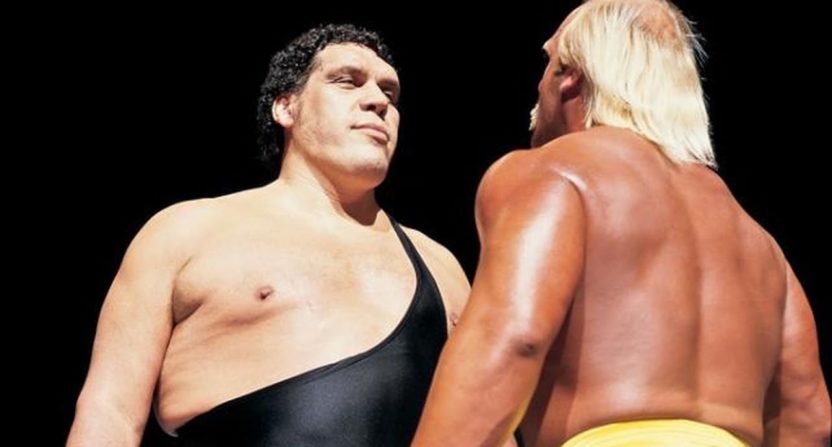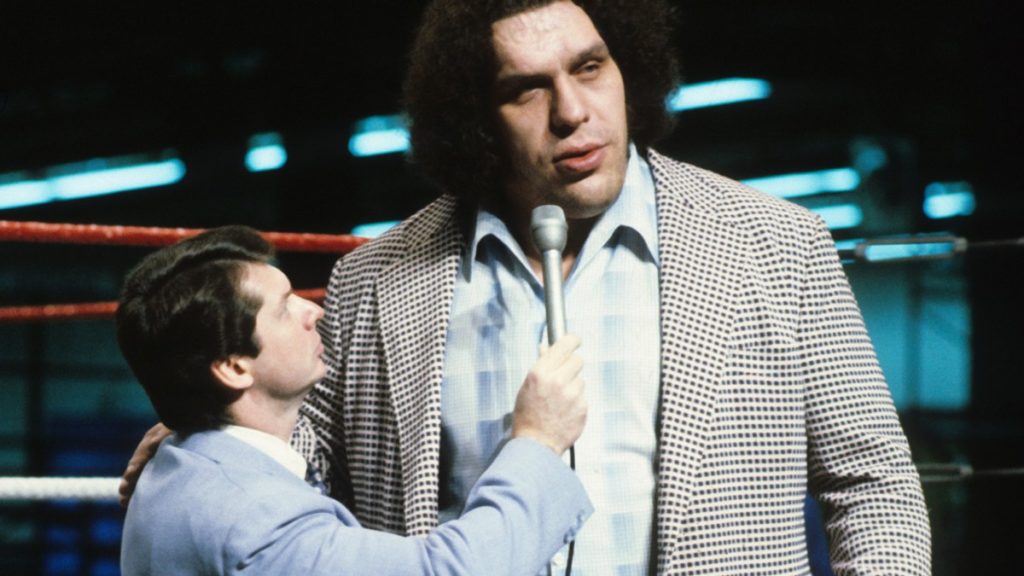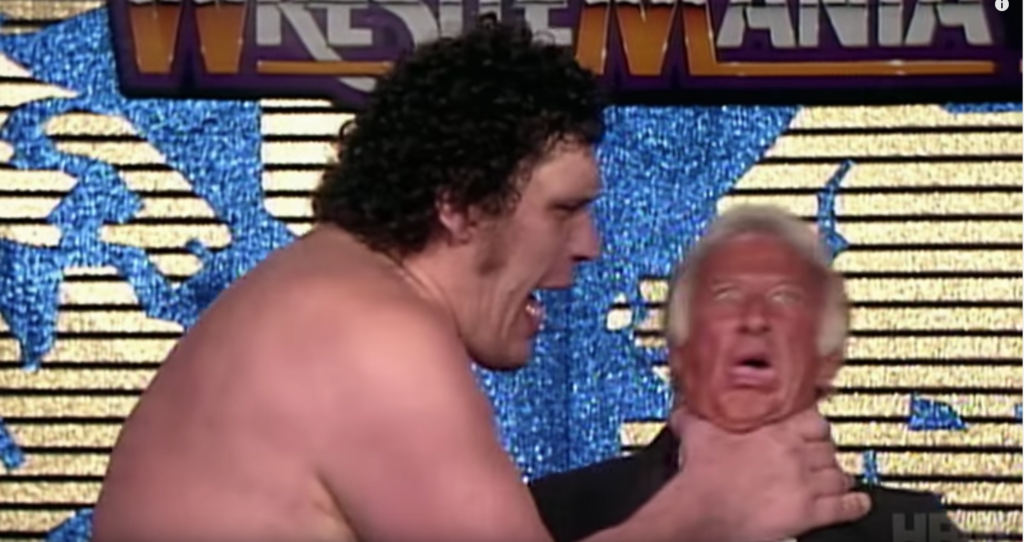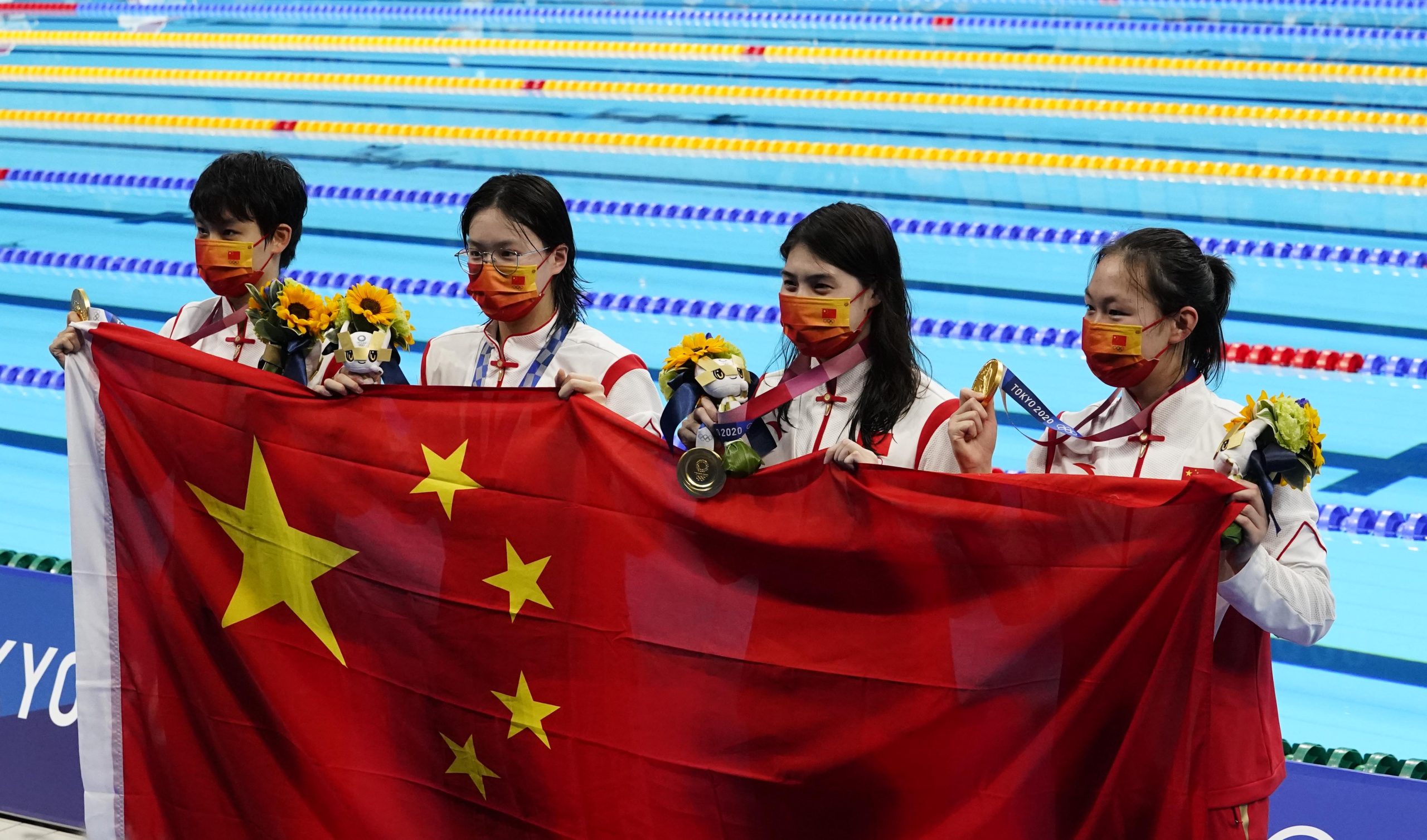I had high expectations for Andre The Giant. It wasn’t just the subject matter, but my high regard for director Jason Hehir who has manned four 30 for 30 films, most of which were very well received (The Fab Five, Bernie and Ernie, The ’85 Bears and the unaired Down In The Valley).
With the WWE’s participation, Bill Simmons producing (this doc will likely be the last thing from his pricey deal with the network, which cancelled his show before the completion of its first season), and the resources and creative freedom that’s part of working with HBO, there was little chance in my mind this wasn’t going to hit the spot.
For viewers who watched ESPN’s Ric Flair 30 for 30, Nature Boy, Andre The Giant is essentially the opposite in many ways. In my review of Nature Boy, I commented on how little the film focused on Flair’s career, instead zeroing in on the man himself and the life he lived outside of the ring. Andre The Giant doesn’t go in that direction and does not only a stellar job retracing his childhood and his career, but also serves as a high-quality introductory course on the history of pro wrestling.
Viewers will eat up this history lesson, treating them to the likes of Vince McMahon, Hulk Hogan, and wrestling historian David Shoemaker. They, along with others, do a marvelous job explaining pro wrestling’s dramatic transformation during Andre’s career. I’m probably in a minority, but as much as I love reliving the many great characters and matches from my youth, I’ve always had a thirst for learning about wrestling as a business and the many different iterations it’s gone through over the years.
When I say the film will leave you wanting more, I mean that in two ways:
1) This film really made me want HBO put out more sports documentaries after what’s been nearly a decade of sparse output in a space the network dominated for so long.
2) As much as I learned about Andre, I felt like the film only scratched the surface in terms of who he was outside of the ring. This was something I brought up with Hehir, who was candid about there not being much material for him to utilize. Here is some of what he said, which I found to be very insightful.
“It certainly wasn’t a conscious decision. If anything, one of the good notes HBO gave us was that they wanted more of Andre in there. So a lot of the on-camera moments of him speaking, I left out because I thought they were insincere since he was in character.
“If there was more out there, believe me, we did all we could both nationally and internationally to uncover every stone and to get any radio and TV interviews we could. He was in character for every single interview we found, except that one soundbite from behind the scenes in The Princess Bride which is taken directly from an Electronic Press Kit for that movie and the raw of that interview, which I would LOVE to see, didn’t exist. We tried all we could to go through the studio and Rob Reiner and everybody else for the raw tape of that interview, because that’s the only time I’ve seen him actually speak candidly about his ailment.
“Obviously, I wish I could have sat the man down himself and asked him some of the questions I would love to have him answer, but it just wasn’t there. We had to do our best to bring this guy to life as much as possible from the people that knew him. The people who knew him in wrestling are notorious for embellishing and exaggerating. You have to take what they say with a grain of salt and there is a certain inherent skepticism viewers will have whenever someone from that world is speaking. So that’s a challenge.
“There was only a certain amount of time we could devote to that because you also have to scratch the nostalgic itch for people that have come to watch a wrestling doc or what this guy is famous for. We could have done an hour about his life on the ranch. We could have done an hour and a half about his childhood growing up in France and what that was like and his visits home and things like that. There are certain decisions you have to make because it’s not going to be a two- or three-hour doc. He was a really guarded guy. So that was the biggest challenge. To try to bring out his personality as much as possible without white-washing it or making it a puff piece. That this guy was a gentle giant and always happy, because obviously nobody is like that that.”
Putting aside the limitations Hehir was working with, where the film delivers big-time is investing in A+ storytelling walking through Andre’s career. The film does an amazing job retracing his entry into the sport, how his stardom helped transform the sport itself, and the memorable matches that are arguably iconic moments in American pop culture.
In particular, the documentary does a tremendous job reliving the WrestleMania III match vs. Hulk Hogan, covering its origin, the dramatic tension brewing behind the scenes, and how it served as the beginning of the end for Andre — not only with his wrestling career, but also his own mortality. I didn’t watch this match growing up, but have always heard about it and seen footage of it and I still found the retelling to be nothing short of riveting.
As the film transitions to the topic of Andre’s early death, I couldn’t help but think that while people lamented his early passing, nobody seemed to express any guilt over not being more assertive with Andre in having him seek medical treatment, continuing to wrestle with his deteriorating health, and his destructive behavior outside of the ring. I asked Hehir about this as well.
“Andre was going to do what he wanted to do. I think people knew that from an early age, Andre was going to go where he wanted to go and stay up until he wanted to stay up, and drink as much as he wanted to drink. He didn’t have a significant other to kind of police him and he was the alpha male wherever he went. So no one was going to tell him what to do. He elected not to seek treatment. That’s his decision. If he’s going to drink that much, that’s his decision. It’s not like these guys thought that they could ask him to stop and he would stop.
“It’s also part of that culture, socializing and going out and numbing pain. These guys are as Hogan told me off-camera, “if wrestling is fake, no one’s told me.” These guys are in a lot of pain because it’s a very physically demanding activity. I didn’t get the sense from anybody that there was anything but Andre’s decision as to how he was going to live his life. He choose not to live the healthiest life but to a man, everyone we spoke with said, don’t feel bad for him because he was one of the happiest guys we knew.”
If you read my 30 for 30 reviews, you know I try to give a ballpark ranking to each of the films in terms of where they stack up compared to the rest of the series, which often gives readers a good sense of just how much it. While ESPN’s Nature Boy and This Was The XFL each earned good, but not great grades from me and additionally scratched that nostalgic wrestling itch, both had enough flaws that the finished products didn’t live up to the revered subject matter.
Andre The Giant is a significantly better film and likely would be in or close to being one of the 10 best 30 for 30 films. (There are nearly 100 of them now!) This is a really slick documentary that I imagine a lot of HBO subscribers will not only enjoy, but find themselves rewatching given how breezy it is.
If indeed the film indeed performs well for HBO, the hope is that the network would reconsider its limited output of sports documentaries and aspired to return to where they were before ceding the space to ESPN.









